In this article, we will review the challenges faced by the health industry in SEO in 2020 and provide some short and mid-term suggestions to help you rank higher in Google. We won’t go deep into SEO basics applicable to any industry but rather focus on:
- how to become an expert in the eyes of Google,
- what is E-A-T and Knowledge graph,
- how Google is adapting to Coronavirus.

Google’s role in Health-related questions
Organic search is a fast, accessible and also discreet source of information. Therefore, it’s an important source of information when it comes to health-related questions. People can address personal questions through Google, look for solutions for their problems, and expect Google to deliver links to trustful resources with good advice.

It’s important to understand that generally appearing at the top of Google results for any page requires performing certain actions, like placing specific keywords people are looking for in the text and title, writing longer original text, getting more backlinks. So somebody focused on SEO could potentially appear in top results in Google even without having a well known and trusted brand.
It might be annoying to see poor quality results when looking for information regarding, e.g., Maine coon cat descriptions. But it’s not a life or death question. However, when it comes to health, false, misleading, fraudulent information in top Google results could influence lives, as people can easily fall for some pills supposedly doing magic.

A study from Northwestern University finds that people tend to quickly download inaccurate or blatantly false statements into memory because it’s easier than critically evaluating and analyzing what they’ve heard. Then later the brain pulls up the incorrect information first because it’s less work to retrieve recently presented material.
Similarly, Daniel Gilbert, a psychologist, suggested that understanding of any statement starts with firstly believing it, and analyzing if it can be false only afterward. Therefore, even in normal conditions, people might believe a lot of things. When it comes to health, our own and close ones, people can be even more susceptive to random information, e.g., about pills that do miracles and procedures that can cure any disease.
Google’s corporate mission states: Our mission is to organize the world’s information and make it universally accessible and useful. Useful is the opposite of harmful. Therefore, it makes a lot of sense that Google improves search algorithms to display not only those sources that know how to play an SEO game but also provide useful, relevant and trustful information.
E-A-T and YLYM concepts
To improve the quality of search results in Health-related industries, Google came out with 3 concepts in 2019 — Beneficial purpose, YMYL, and E-A-T. These concepts are not presented in the form of an official statement. However, they are listed in the Google Search Quality Evaluator Guidelines.
BENEFICIAL PURPOSE
The page should have a purpose and help users. Websites without a beneficial purpose will receive lower rankings. Those that potentially spread hate, cause harm, misinform or deceive users should not expect to stay in top positions as well.
YLYM
“Your Money or Your Life” (YMYL for short) is a category of pages or topics which could potentially impact a person’s future happiness, health, financial stability, or safety, for example, insurance, eCommerce, law and medicine.
E-A-T
For YLYM pages the guidelines which makes it a page deserving to appear in Google’s TOP results are more strict. Google highlighted that the following factors are especially important:
- The expertise of the content creator
- The authoritativeness of the content creator, the content itself, and the website
- The trustworthiness of the content creator, the content itself, and the website
Google doesn’t provide a straightforward checklist of what one should do to ensure high E-A-T. However, there some specific ideas mentioned:
- Medical advice should be written or produced by people or organizations with appropriate medical expertise or accreditation.
- Medical advice or information should be written or produced in a professional style and should be edited, reviewed, and updated regularly.
- News articles should be produced with journalistic professionalism containing factually accurate content, presented in a way that helps users achieve a better understanding of events.
- High E-A-T information pages on scientific topics should be produced by people or organizations with appropriate scientific expertise and represent a well-established scientific consensus on issues where such consensus exists.
- If they have real-life experience, ordinary people can contribute to high E-A-T pages as well. For example, cancer patients in a blog sharing their stories would also be considered as high E-A-T.
From a practical perspective, if you are an eCommerce store selling vitamins it might be much more complicated to rank for generic keywords speaking, e.g., about health issues which might require supplements or vitamins helping for cold. As for such search terms you would need to be a respected name in the medical industry. For example, the first place in Google for a keyword “vitamins” is taken by the U.S. National Library of Medicine, a website of government institutions.
Becoming experts of the Healthcare industry
There isn’t one magic formula for becoming a high authority website in the YMYL industry. However, there are some steps to take besides creating unique, valuable, useful, and quotable content which has backlinks pointing to it as per best and basic SEO practices. Before digging into practical steps, let’s explore another concept which could better explain how Google can evaluate whether you are an expert in your industry.
Concept of the Knowledge Graph
Here is a video from 2012 when the knowledge graph was introduced. Many things have been updated since then, but the concept is still applicable.
Thanks to the knowledge graph, Google can understand concepts, synonyms, and related ideas. If we search for the world’s fastest man, we get information about Usain Bolt straight away. Google can connect both terms and show relevant information.
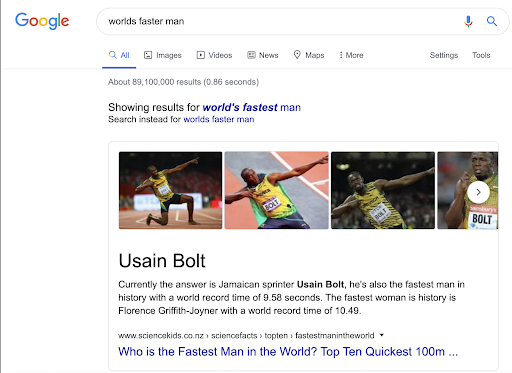
Another example of an open graph in practice is when we search for notable celebrities, brands, organizations, etc. Often we will see a so-called knowledge panel on the right side in the Google search result page. Knowledge panel provides a compilation of facts, e.g., name of the person, height, education, etc.
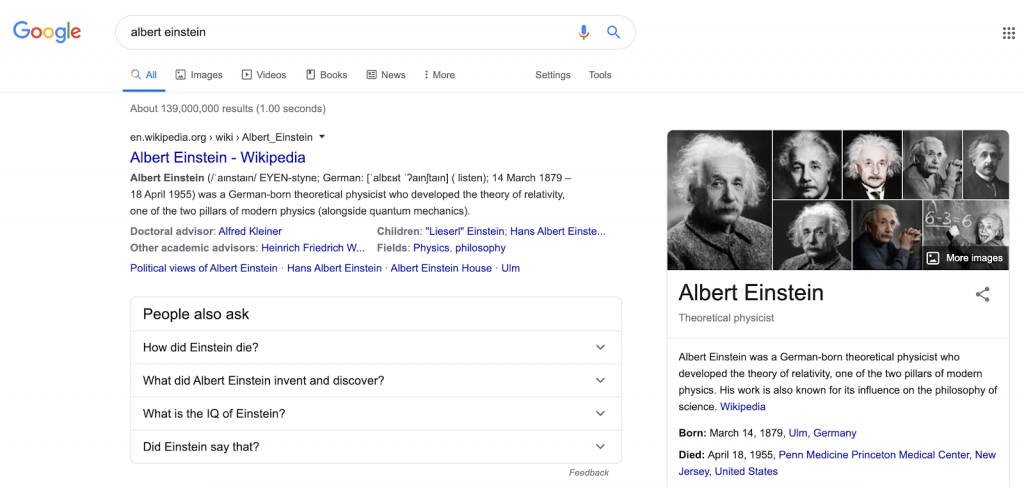
Doctors who stand out in their field also can have a knowledge panel combined from various sources.
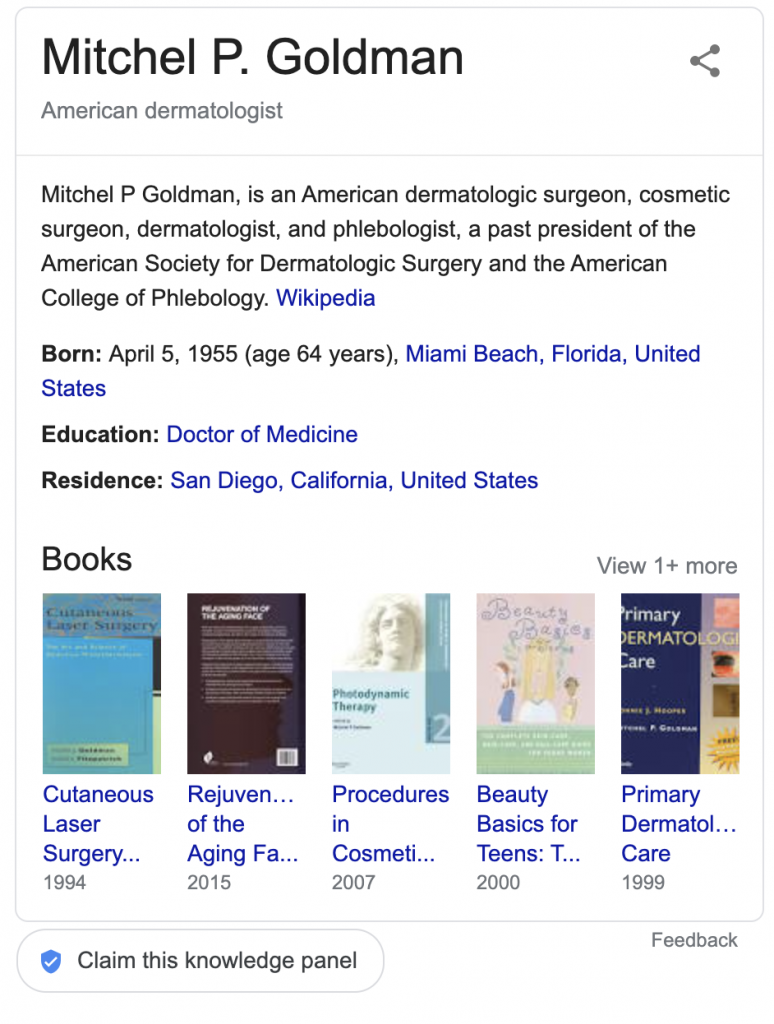
Knowledge panel is not a bulletproof indicator of being an expert, and many great websites can exist without it. However, if you are looking for, e.g., fitness trainer to cooperate on a PR project or guest blogging opting, a person with a strong online presence might bring you more benefits from an SEO perspective than working with a good specialist who doesn’t appear on the internet often.
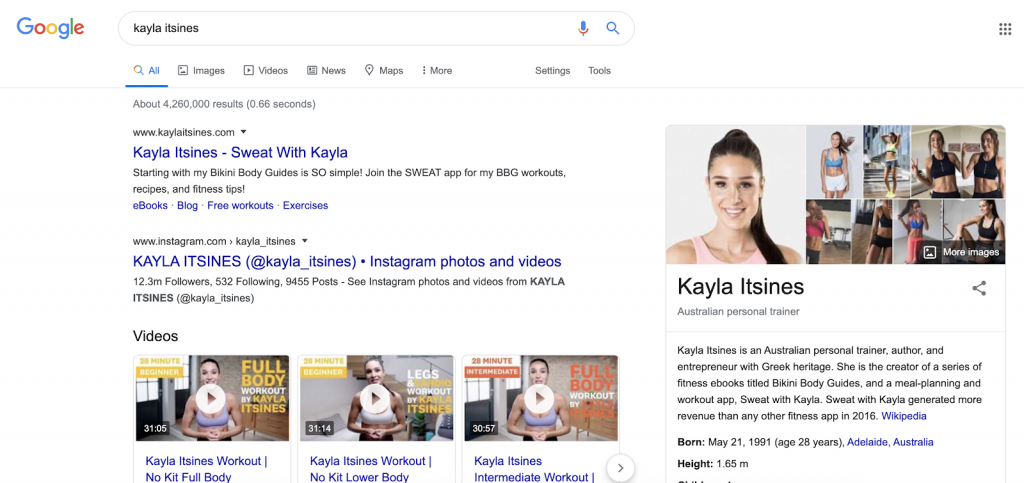
The main conclusion is that your success in Google relies not only on the work quality of SEO specialists in a classical understanding, but rather common efforts of SEO best practice implementation, public relations, excellent customer service, branding, and general marketing.
Simple things you can do now:
Reviews
Monitor reviews customers leave about your website, service, or product online. Proactively ask your customers to leave reviews on yours and relevant industry websites.
Real business information
Make sure you have contact information and a clear owner on your website. If you or your company employees have knowledge panels, make sure they are claimed, so that you can edit the information there.
Blog posts
If you have a blog, make sure authors have a bio section, and Google can identify if they are experts in the industry.
Wikipedia
It’s an authoritative source of information for the knowledge panel. If a person or an organization has a Wikipedia page, we can consider them as notable, and it could help to ensure higher E-A-T.
Social signals
Have active social media profiles.
Listings
Make sure you are present in industry-related listings and top resources overall, e.g., have Google My Business account, etc.
Basics in place
A little reminder: your website can’t have technical issues, should be fast and mobile-friendly, with SEO basics implemented, e.g., a well-thought URL structure, canonical tags, robots.txt, and XML sitemap. If search engine bots can’t access or read your content, any other activities won’t make a difference.
Consider for middle-term and long-term
Experts
Build relationships with industry leaders or create experts from your personnel.
SEO education
Ensure that your marketing, content, and PR departments are well aware of SEO concepts and consider the best practices when planning daily activities or campaigns which are not directly related to SEO.
Branding
Strong, authoritative brands have a higher chance of being quoted in resources with a good reputation, referred by customers or patients in forums, etc. Google considers links pointing to your page as indicators of truthfulness. As a result, the more backlinks there are pointing to you, the higher you will appear in rankings.
Good SEO specialists use various tactics to craft backlinks profiles that look like natural ones and other brands would have earned organically. SEO link building is cheaper in the short term. However, combining off-page SEO awareness with active public relation campaigns, publishing useful industry-related researches, delivering excellent service and products, and so on, you will get much better results not only in SEO but in overall business sense long-term.
Diversification
It might seem like strange advice in a blog post about SEO, but make sure that you strategically separate your resources between different marketing communication channels, invest in Conversion Rate Optimization and e-mail marketing, opt for influencer marketing if it’s applicable for your sphere, involve yourself in sponsoring. It can directly or indirectly improve your organic traffic KPIs as well. This way you can also be sure that your traffic won’t vanish in case of emergencies due to Google algorithm changes.
Influence of COVID-19 or other crisis
Google searches related to the health industry are currently booming.
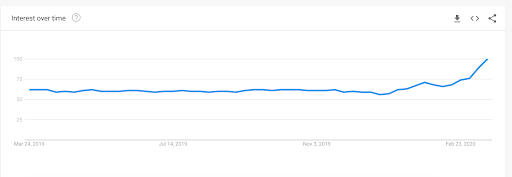
Relative Health related searches in last 12 months, according to Google trends
The biggest growth is related to Coronavirus searches. There are no exact numbers, but Coronavirus related searches surpassed Weather and News overall, according to Google trends.
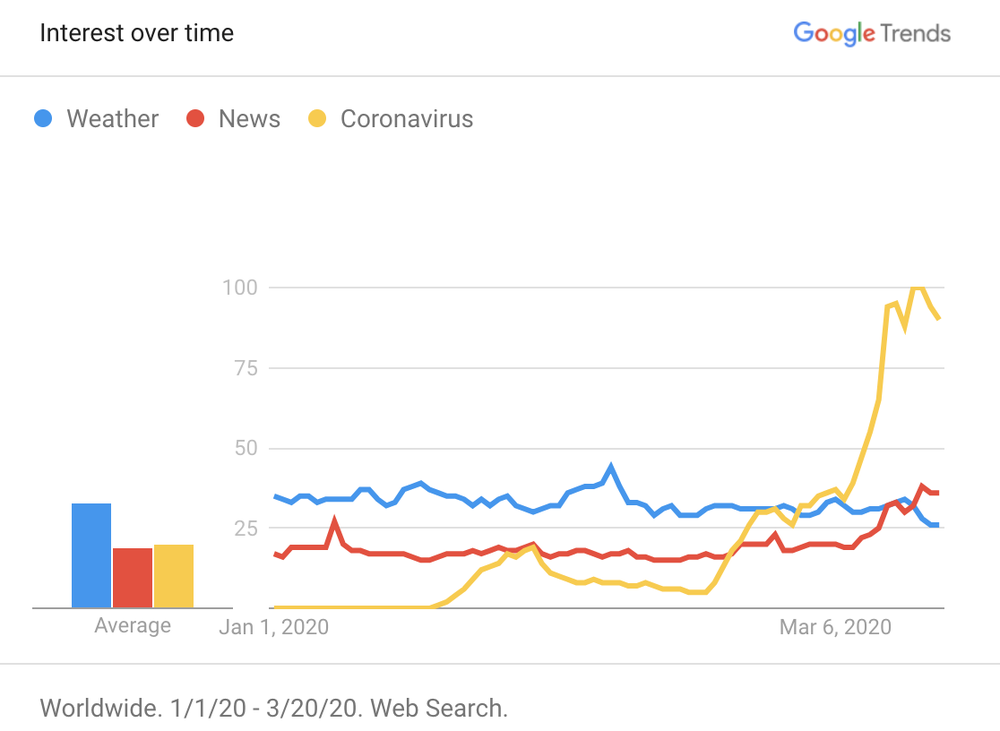
Relative Coronavirus, Influenza and Cold related searches in last 12 months, according to Google trends
If we look at Google search results when searching for Corona keyword on February 25th:
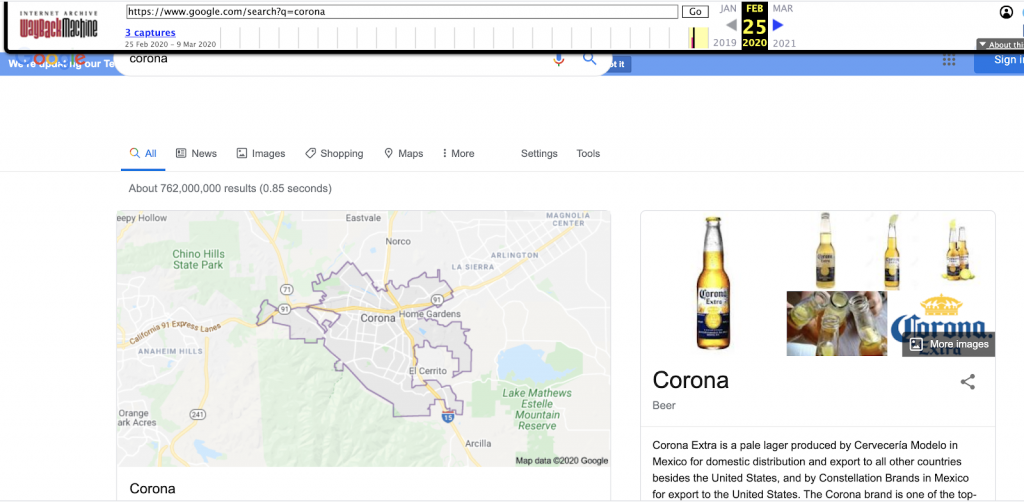
…and compare it to March 24th (in the USA):
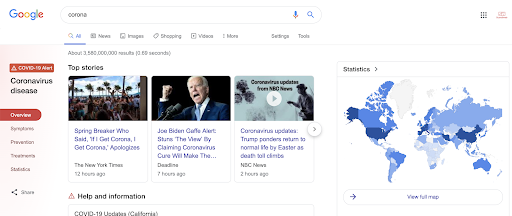
Google has significantly adjusted results that users see to ensure the authoritative sources are easily accessible. Even top SEO experts won’t be able to get their website dedicated to homemade COVID-19 cures into top results for generic search terms.
Google also made changes in advertising policies, and currently, it’s not possible to run ads for face mask related terms.
How to be more ready for a similar crisis in the future?
Do your homework
If you never invested in SEO on purpose, but your website is getting the biggest share of traffic from SEO, it’s important to understand the reasons and strengthen the positions. You may be ranking for very low traffic niche keywords. That way it’s simple for competitors to outrank you if keywords become more popular.
Diversify traffic
If your traffic depends on paid traffic, social or referrals only, it’s not sustainable. If it fully depends on SEO, it’s rather risky. Split your traffic and make sure to have direct access to your website visitors, e.g., by collecting their emails, so you can reach them in case of an emergency.
Need assistance in improving your position in search results? Have additional SEO concerns? Let us help you! Feel free to browse our SEO services and don’t hesitate to get in touch!



Share on: